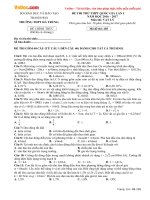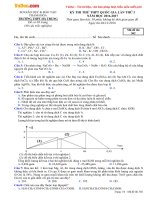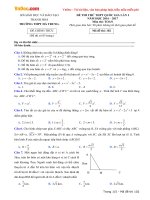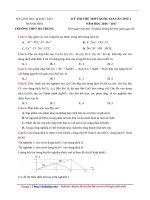Tải Đề thi thử THPT Quốc gia năm 2017 môn Tiếng Anh trường THPT Hà Trung, Thanh Hóa (Lần 1) Có ĐÁP ÁN - Đề thi thử đại học môn Tiếng Anh có đáp án
Bạn đang xem bản rút gọn của tài liệu. Xem và tải ngay bản đầy đủ của tài liệu tại đây (134.1 KB, 6 trang )
<span class='text_page_counter'>(1)</span><div class='page_container' data-page=1>
SỞ GIÁO DỤC VÀ ĐÀO TẠO
THANH HOÁ
<b>TRƯỜNG THPT HÀ TRUNG.</b>
<b>ĐỀ THI THỬ THPT QUỐC GIA LẦN I</b>
<b>NĂM HỌC 2016 – 2017</b>
<b>Môn thi: TIẾNG ANH</b>
<i>Thời gian làm bài: 60 phút, khơng kể thời gian phát đề.</i>
ĐỀ CHÍNH THỨC <b>Mã đề thi: 901</b>
(Đề thi có 05 trang )
<i><b>Mark the letter A, B, C, or D on your answer sheet to indicate the word whose underlined part differs</b></i>
<i><b>from the other three in pronunciation in each of the following questions.</b></i>
<b>Question 1: A. blamed</b> <b>B. misused</b> <b>C. dissolved</b> <b>D. increased</b>
<b>Question 2: A. blouses</b> <b>B. amuses</b> <b>C. purses</b> <b>D. pleases</b>
<i><b>Mark the letter A, B, C, or D on your answer sheet to indicate the word that differs from the other three</b></i>
<i><b>in the position of primary stress in each of the following questions.</b></i>
<b>Question 3: A. particular</b> <b>B. circumstances</b> <b>C. environment</b> <b>D. advertisement</b>
<b>Question 4: A. pleasure</b> <b>B. capture</b> <b>C. picture</b> <b>D. ensure</b>
<i><b>Mark the letter A, B, C, or D on your answer sheet to indicate the underlined part that needs correction</b></i>
<i><b>in each of the following questions. </b></i>
<b>Question 5: Ancient people used pot for cooking, storing food, and carrying things from place to </b>
A B C D
place.
<b>Question 6: Chemical engineering is based on the principles of physics, chemists, and mathematics. </b>
A B C D
<b>Question 7: David is particularly fond of cooking, and he often cooks really delicious meals.</b>
A B C D
<i><b>Mark the letter A, B, C, or D on your answer sheet to indicate the correct answer to each of the</b></i>
<i><b>following questions.</b></i>
<b>Question 8: All his plans for starting his own business fell __________.</b>
<b>A. in</b> <b>B. through</b> <b>C. down</b> <b>D. away</b>
Question 9: The _____ dressed woman in the advertisement has a pose smile on her face.
<b>A. stylistic</b> <b>B. stylishly</b> <b>C. stylish</b> <b>D. stylistical</b>
<b>Question 10: “Never say that again, ...?”</b>
<b>A. won’t you</b> <b>B. do you</b> <b>C. don’t you</b> <b>D. will you</b>
Question 11: If he is in trouble, it is his own fault, I personally wouldn’t _____ a finger to help him.
<b>A. give</b> <b>B. turn</b> <b>C. rise</b> <b>D. bend</b>
<b>Question 12: ____________ to the national park before, Sue was amazed to see the geyser.</b>
<b>A. Being not</b> <b>B. Not having been</b> <b>C. Not being</b> <b>D. Having not been</b>
Question 13: It was very ______ of you to pay for all the drinks last night.
A. sensitive B. thoughtful C. grateful <b>D. nice</b>
<b>Question 14: He was ______ speaker!</b>
<b>A. how a good</b> <b>B. what a good</b> <b>C. so a good</b> <b>D. so good a</b>
Question 15: By the end of last March, I _____ English for five years.
A. will have been studying <b>B. had been studying</b>
</div>
<span class='text_page_counter'>(2)</span><div class='page_container' data-page=2>
<b>Question 16: It was announced that neither the passengers nor the driver ______ in the crash.</b>
<b>A. was injured</b> <b>B. injured</b> <b>C. were injured</b> <b>D. had injured</b>
Question 17: I am sorry. I want _____ to you, but I have been busy.
<b>A. to write</b> B. writing <b>C. to have written</b> <b>D. to have been writing</b>
<b>Question 18: You ___________ to your teacher like that. It was very rude.</b>
<b>A. shouldn't have talked</b> <b>B. mustn’t talk</b>
<b>C. shouldn’t talk</b> <b>D. mustn’t have talked</b>
<b>Question 19: ______, he felt so unhappy and lonely.</b>
<b>A. In spite of his being wealth</b> <b>B. Rich as was he</b>
<b>C. Despite his wealthy</b> <b>D. Rich as he was</b>
<i><b> Mark the letter A, B, C, or D on your answer sheet to indicate the most suitable response to complete</b></i>
<i><b>each of the following exchanges. </b></i>
<b>Question 20: "Wow! What a nice coat you are wearing!" - "______"</b>
<b>A. Certainly. Do you like it, too?</b> <b>B. Thanks. My mother bought it for me.</b>
<b>C. I like you to say that.</b> <b>D. Yes, of course. It's expensive.</b>
<b>Question 21: "Our team has just won the last football match." </b> - "______"
<b>A. Good idea. Thanks for the news.</b> <b>B. Yes. I guess it's very good.</b>
<b>C. Well, that's very surprising!</b> <b>D. Yes, it's our pleasure.</b>
<i><b>Mark the letter A, B, C, or D on your answer sheet to indicate the word(s) CLOSEST in meaning to the</b></i>
<i><b>underlined word(s) in each of the following questions. </b></i>
<b>Question 22: We spent the entire day looking for a new house</b>
<b>A. all long day</b> <b>B. day after day</b> <b>C. all day long</b> <b>D. the long day</b>
Question 23: I used to meet him occasionally on Avenue.
<b>A. one time</b> <b>B. sometimes</b> <b>C. in one occasion</b> <b>D. none is correct</b>
<i><b>Mark the letter A, B, C, or D on your answer sheet to indicate the word(s) OPPOSITE in meaning to</b></i>
<i><b>the underlined word(s) in each of the following questions. </b></i>
<b>Question 24: The bank announced that it was to merge with another of the high street banks.</b>
<b>A. associate</b> <b>B. cooperate</b> <b>C. assemble</b> <b>D. separate</b>
<b>Question 25: He had never experienced such rudeness towards the president as it occurred at the annual</b>
meeting in May.
<b>A. impoliteness</b> <b>B. encouragement</b> <b>C. politeness</b> <b>D. measurement</b>
<i><b>Mark the letter A, B, C, or D on your answer sheet to indicate the sentence that is closest in meaning to</b></i>
<i><b>each of the following questions. </b></i>
Question 26: Impressed as we were by the new cinema, we found it rather expensive.
A. The new cinema was more expensive than we expected.
B. The new cinema impressed us because it was rather expensive.
<b>C. We were very impressed by the new cinema, but we found it rather expensive.</b>
D. We were not impressed by the new cinema at all because it looked rather expensive.
<b>Question 27: “You should have finished the report by now,” John told his secretary.</b>
<b>A. John reproached his secretary for not having finished the report.</b>
<b>B. John said that his secretary had not finished the report.</b>
<b>C. John reminded his secretary of finishing the report on time.</b>
<b>D. John scolded to his secretary for not having finished the report.</b>
<i><b>Question 28: When I picked up my book I found that the cover had been torn.</b></i>
<b>A. Picking up my book, the cover had been torn.</b>
</div>
<span class='text_page_counter'>(3)</span><div class='page_container' data-page=3>
<i><b>Mark the letter A, B, C, or D on your answer sheet to indicate the sentence that best combines each pair</b></i>
<i><b>of sentences in the following questions. </b></i>
<b>Question 29: “Make good use of your time. You won’t get such an opportunity again” said he to me.</b>
<b>A. He let me make use of my time because I wouldn’t get an opportunity again.</b>
<b>B. He advised me to make use of my time as I wouldn’t get an opportunity again.</b>
<b>C. He ordered me to make use of my time saying that I wouldn’t get an opportunity again</b>
<b>D. He offered me such an opportunity so that I could make good use of my time.</b>
<b>Question 30: Her living conditions were difficult. However, she studied very well.</b>
<b> A. Although she lived in difficult conditions, but she studied very well.</b>
<b>B. She studied very well thanks to the fact that she lived in difficult conditions.</b>
<b>C. Difficult as her living conditions, she studied very well.</b>
<b>D. She studied very well in spite of her difficult living conditions.</b>
<i><b>Read the following passage and mark the letter A, B, C, or D on your answer sheet to indicate the</b></i>
<i><b>correct word or phrase that best fits each of the numbered blanks. </b></i>
Engineers have been dreaming of an underwater link between Britian and France since 1802. Finally, in
1994the Channel Tunnel( nickname” the Chunnel” by the English) was officially opened.This fifteen
million dollar project took seven years to complete .It is 50km long and built 45 metres under the seabed.
The trains which go through the Chunnel can travel at up to 300km/h due to the(31)…….. electrical
system.
The journey from London to Paris via the Chunnel takes just three hours. It is also handy for drivers
since they can load their cars onto the trains. They don’t need to book in(32)………., as trains depart every
few minutes.However, while on the train, there isn’t much to do and many criticise the Chunnel for this.
Unlike the ferries, there is no duty- free shopping , no video game parlour or refreshment stand(33).
………. can you look outside and enjoy the view. As a result, many would find the Chunnel(34)…….. and
would take the ferry(35)……..
<b>Question 31: A. forward</b> B. advanced C. progressive D. improved
<b>Question 32: A. advance</b> B. time C. ahead D. future
<b>Question 33: A. Nor</b> B. Either C. Neither D. Not
<b>Question 34: A. unlikely</b> B. unwanted C. unappealing D. unpopular
<b>Question 35: A. instead</b> B. however C. rather D. otherwise
<i><b>Read the following passage and mark the letter A, B, C, or D on your answer sheet to indicate the</b></i>
<i><b>correct answer to each of the questions. </b></i>
Animals have an intuitive awareness of quantities. They know without analysis the difference between
<i>a number of objects and a smaller number. In his book “ The natural History of Selboure ” (1786 ) , the</i>
<b>naturalist Gilbert White tells how he surreptitiously removed one egg a day from a plover’s nest , and</b>
how the mother laid another egg each day to make up for the missing one . He noted that other species of
birds ignore the absence of a single egg but abandon their nests if more than one egg has been removed. It
has also been noted by naturalists that a certain type of wasp always provides five – never four, never six
-caterpillars for each of their eggs so that their young have something to eat when the eggs hatch .
<b>Research has also shown that both mice and pigeons can be taught to distinguish between odd and even</b>
numbers of food pieces.
<b> These and similar accounts have led some people to infer that creatures other than humans can</b>
actually count. They also point to dogs that have been taught to respond to numerical questions with the
correct number of barks, or to horses that seem to solve arithmetic problems by stomping their hooves the
proper number of times.
</div>
<span class='text_page_counter'>(4)</span><div class='page_container' data-page=4>
<b>evidence of counting, nor do they reveal more than innate instincts, refined by the genes of successive</b>
generations, or the results of clever, careful conditioning by trainers .
<b>Question 36: What is the main idea of this passage?</b>
<b>A. Although animals may be aware of quantities, they cannot actually count.</b>
<b>B. Of all animals, dogs and horses can count best.</b>
<b>C. Careful training is required to teach animals to perform tricks involving numbers</b>
<b>D. Animals cannot “count” more than one kind of object.</b>
<b>Question 37: Why does the author refer to Gilbert White’s book in line 2?</b>
<b>A. To indicate that more research is needed in this field.</b>
<b>B. To show how attitudes have changed since1786.</b>
<b>C. To provide evidence that some birds are aware of quantities.</b>
<b>D. To contradict the idea that animals can count.</b>
<b>Question 38: The word “surreptitiously” is closest in meaning to</b>
<b>A. quickly</b> <b>B. occasionally</b> <b>C. stubbornly</b> <b>D. secretly</b>
<b>Question 39: The word “odd” refers to which of the following?</b>
<b>A. numbers such as 1, 3, 5 and so on</b> <b>B. lucky numbers</b>
<b>C. numbers such as 2, 4, 6 and so on</b> <b>D. unusual numbers</b>
<b>Question 40: The author mentions that all of the following are aware of quantities in some ways EXCEPT</b>
<b>A. wasps</b> <b>B. Plovers</b> <b>C. caterpillars</b> <b>D. mice</b>
<b>Question 41: The word “accounts” is closest in meaning to</b>
<b>A. reasons</b> <b>B. reports</b> <b>C. deceptions</b> <b>D. invoices</b>
<b>Question 42: How would the author probably characterize the people who are mentioned in the first line</b>
of the second paragraph
<b>A. As foolish</b> <b>B. As demanding</b> <b>C. As clever</b> <b>D. As mistaken</b>
<i><b>Read the following passage and mark the letter A, B, C, or D on your answer sheet to indicate the</b></i>
<i><b>correct answer to each of the questions. </b></i>
Until recently, most American entrepreneurs were men. Discrimination against women in business, the
demands of caring for families, and lack of business training had kept the number of women entrepreneurs
small. Now, however, businesses owned by women account for more than $40 billion in annual revenues,
and this figure is likely to continue rising throughout the 1990s. As Carolyn Doppelt Gray, an official of
the Small Business Administration, has noted, "The 1970s was the decade of women entering
management, and the 1980s turned out to be the decade of the woman entrepreneur". What are some of
the factors behind this trend? For one thing, as more women earn advanced degrees in business and enter
<b>the corporate world, they are finding obstacles. Women are still excluded from most executive suites.</b>
Charlotte Taylor, a management consultant, had noted, "In the 1970s women believed if they got an MBA
<b>and worked hard they could become chairman of the board. Now they've found out that isn't going to</b>
happen, so they go out on their own".
In the past, most women entrepreneurs worked in "women's" fields: cosmetics and clothing, for
example. But this is changing. Consider ASK Computer Systems, a $22-million-a-year computer software
business. It was founded in 1973 by Sandra Kurtzig, who was then a housewife with degrees in math and
engineering. When Kurtzig founded the business, her first product was software that let weekly
<b>newspapers keep tabs on their newspaper carriers-and her office was a bedroom at home, with a shoebox</b>
<b>under the bed to hold the company's cash. After she succeeded with the newspaper software system, she</b>
hired several bright computer-science graduates to develop additional programs. When these were
marketed and sold, ASK began to grow. It now has 200 employees, and Sandra Kurtzig owns $66.9
million of stock.
Of course, many women who start their own businesses fail, just as men often do. They still face
<b>hurdles in the business world, especially problems in raising money; the banking and finance world is still</b>
dominated by men, and old attitudes die hard. Most businesses owned by women are still quite small. But
the situation is changing; there are likely to be many more Sandra Kurtzigs in the years ahead.
<b>Question 43: What is the main idea of this passage?</b>
</div>
<span class='text_page_counter'>(5)</span><div class='page_container' data-page=5>
<b>B. Women today are better educated than in the past, making them more attractive to the business </b>
world.
<b>C. Women are better at small business than men are.</b>
<b>D. Women today are opening more business of their own.</b>
<b>Question 44: The word “excluded” is closest meaning to _________ .</b>
<b>A. often invited to</b> <b>B. decorators of</b>
<b>C. not permitted in</b> <b>D. charged admission to</b>
<b>Question 45: All of the following were mentioned in the passage as detriments to women in the business</b>
<b>world EXCEPT _________ .</b>
<b>A. Women were required to stay at home with their families.</b>
<b>B. Women faced discrimination in business.</b>
<b>C. Women lacked ability to work in business.</b>
<b>D. Women were not trained in business.</b>
<b>Question 46: According to the passage, Charlotte Taylor believes that women in 1970s _________ </b>
<b>A. were unrealistic about their opportunities in business management.</b>
<b>B. had fewer obstacles in business than they do today.</b>
<b>C. were unable to work hard enough to success in business.</b>
<b>D. were still more interested in education than business opportunities</b>
<b>Question 47: The author mentions the “ shoesbox under the bed” in order to _________ .</b>
<b>A. show the resourcefulness of Sandra Kurtzig</b>
<b>B. Show the frugality of women in business</b>
<b>C. Point out that initially the financial resources of Sandra Kurtzig’s business were limited</b>
<b>D. suggest that the company needed to expand</b>
<b>Question 48: The expression “ keep tabs on” is closest meaning to _________ .</b>
<b>A. pay the salaries of</b> <b>B. keep records of</b>
<b>C. provide transportation for</b> <b>D. recognize the appearance of</b>
<b>Question 49: The word “hurdles” can be best replaced by __________ .</b>
A. fences B .obstacles C. questions D. small groups
<b>Question 50: It can be inferred from the passage that the author believes that business operated by women</b>
are small because ________ .
<b>A. many women fail at large businesses.</b> <b>B. Women are not able to borrow money easily.</b>
<b>C. Women prefer a small intimate setting.</b> <b>D. Women can’t deal with money.</b>
<i><b>---- The End </b></i>
<i>---Đáp án </i>
<b>CÂU</b> <b>901</b>
<b>1</b> D
<b>2</b> C
<b>3</b> B
<b>4</b> D
<b>5</b> A
<b>6</b> C
<b>7</b> D
<b>8</b> B
<b>9</b> B
<b>10</b> D
<b>11</b> A
<b>12</b> B
<b>13</b> D
<b>14</b> D
</div>
<span class='text_page_counter'>(6)</span><div class='page_container' data-page=6>
<b>16</b> A
<b>17</b> C
<b>18</b> A
<b>19</b> D
<b>20</b> B
<b>21</b> C
<b>22</b> C
<b>23</b> B
<b>24</b> D
<b>25</b> C
<b>CÂU</b> <b>901</b>
<b>26</b> C
<b>27</b> A
<b>28</b> B
<b>29</b> B
<b>30</b> D
<b>31</b> D
<b>32</b> A
<b>33</b> A
<b>34</b> C
<b>35</b> A
<b>36</b> A
<b>37</b> C
<b>38</b> D
<b>39</b> A
<b>40</b> C
<b>41</b> B
<b>42</b> D
<b>43</b> D
<b>44</b> C
<b>45</b> C
<b>46</b> A
<b>47</b> C
<b>48</b> B
<b>49</b> A
</div>
<!--links-->









